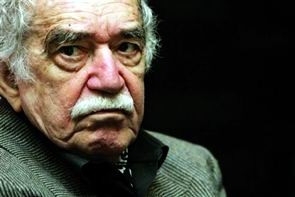(单词翻译:单击)
名著阅读
"Look where this fellow turned up," the captain said. "It's Gregorio Stevenson."
At dawn, after a summary court martial, Arcadio was shot against the wall of the cemetery. In the last two hours of his life he did not manage to understand why the fear that had tormented him since childhood had disappeared. Impassive. without even worrying about making a show of his recent bravery, he listened to the interminable charges of the accusation. He thought about úrsula, who at that hour must have been under the chestnut tree having coffee with José Arcadio Buendía. He thought about his eight-month-old daugh-ter, who still had no name, and about the child who was going to be born in August. He thought about Santa Sofía de la Piedad, whom he had left the night before salting down a deer for next day's lunch, and he missed her hair pouring over her shoulders and her eyelashes, which looked as if they were artificial. He thought about his people without sentimentality, with a strict dosing of his accounts with life, beginning to understand how much he really loved the people he hated most. The president of the court-martial began his final speech when Arcadio realized that two hours had passed. "Even if the proven charges did not have merit enough," the president was saying, "the irresponsible and criminal boldness with which the accused drove his subordinates on to a useless death would be enough to deserve capital punishment." In the shattered schoolhouse where for the first time he had felt the security of power, a few feet from the room where he had come to know the uncertainty of love, Arcadio found the formality of death ridiculous. Death really did not matter to him but life did, and therefore the sensation he felt when they gave their decision was not a feeling of fear but of nostalgia. He did not speak until they asked him for his last request.
"Tell my wife," he answered in a well-modulated voice, "to give the girl the name of úrsula." He paused and said it again: "úrsula, like her grandmother. And tell her also that if the child that is to be born is a boy, they should name him José Arcadio, not for his uncle, but for his grandfather."
Before they took him to the execution wall Father Nicanor tried to attend him. "I have nothing to repent," Arcadio said, and he put himself under the orders of the squad after drinking a cup of black coffee. The leader of the squad, a specialist in summary executions, had a name that had much more about it than chance: Captain Roque Carnicero, which meant butcher. On the way to the cemetery, under the persistent drizzle, Arcadio saw that a radiant Wednesday was breaking out on the horizon. His nostalgia disappeared with the mist and left an immense curiosity in its place. Only when they ordered him to put his back to the wall did Arcadio see Rebeca, with wet hair and a pink flowered dress, opening wide the door. He made an effort to get her to recognize him. And Rebeca did take a casual look toward the wall and was paralyzed with stupor, barely able to react and wave goodbye to Arcadio. Arcadio answered her the same way. At that instant the smoking mouths of the rifles were aimed at him and letter by letter he heard the encyclicals that Melquíades had chanted and he heard the lost steps of Santa Sofía de la Piedad, a virgin, in the classroom, and in his nose he felt the same icy hardness that had drawn his attention in the nostrils of the corpse of Remedios. "Oh, God damn it!" he managed to think. "I forgot to say that if it was a girl they should name her Remedios." Then, all accumulated in the rip of a claw, he felt again all the terror that had tormented him in his life. The captain gave the order to fire. Arcadio barely had time to put out his chest and raise his head, not understanding where the hot liquid that burned his thighs was pouring from.
"Bastards!" he shouted. "Long live the Liberal Party!"
“你们瞧,他钻到哪儿来啦,”上尉说,“这是格列戈里奥·史蒂文森呀。”
黎明时分,根据战地军事法庭的判决,阿卡蒂奥在墓地的墙壁前面被枪决了。在一生的最后两小时里,他还没弄明白,他从童年时代起满怀的恐惧为什么消失了。他倾听他的各项罪行时是十分平静的,完全不是因为打算表现不久之前产生的勇气。他想起了乌苏娜——这时,她大概跟霍·阿·布恩蒂亚一起,正在栗树下面喝咖啡。他想起了还没取名的八个月的女儿,想起了八月间就要出生的孩子。他想起了圣索菲娅·德拉佩德,想起了昨天晚上他出来打仗时,她为了第二天的午餐而把鹿肉腌起来的情景,他记起了她那披到两肩的头发和又浓又长的睫毛,那样的睫毛仿佛是人造的。他怀念亲人时并没有感伤情绪,只是严峻地总结了自己的一生,开始明白自己实际上多么喜爱自己最憎恨的人。法庭庭长作出最后判决时,阿卡蒂奥还没发现两个小时已经过去了。“即使列举的罪行没有充分的罪证,”庭长说,“但是根据被告不负责任地把自己的部下推向毫无意义的死亡的鲁莽行为,已经足以判决被告的死刑。”在炮火毁掉的学校里,他曾第一次有过掌权以后的安全感,而在离这儿几米远的一个房间里,他也曾模糊地尝到过爱情的滋味,所以他觉得这一套死亡的程序太可笑了。其实,对他来说,死亡是没有意义的,生命才是重要的。因此,听到判决之后,他感到的不是恐惧,而是留恋。他一句话没说,直到庭长问他还有什么最后的要求。
“请告诉我老婆,”他用响亮的声音回答。“让她把女儿取名叫乌苏娜,”停了停又说:“象祖母一样叫做乌苏娜。也请告诉她,如果将要出生的是个男孩,就管他叫霍·阿卡蒂奥,但这不是为了尊敬我的大伯,而是为了尊敬我的祖父。”
在阿卡蒂奥给带到墙边之前,尼康诺神父打算让他忏悔。“我没有什么忏悔的,”阿卡蒂奥说,然后喝了一杯黑咖啡,就听凭行刑队处置了。行刑队长是个“立即执行”的专家,他的名字并不偶然,叫做罗克·卡尼瑟洛上尉,意思就是“屠夫”。毛毛丽不停地下了起来,阿卡蒂奥走向墓地的时候,望见天际出现了星期二灿烂的晨光。他的留恋也随着夜雾消散了,留下的是无限的好奇。行刑队命令他背向墙壁站立时,他才发现了雷贝卡——她满头湿发,穿一件带有粉红色小花朵的衣服,正把窗子打开。他竭力引起她的注意。的确,雷贝卡突然朝墙壁这边瞥了一眼,就惊恐得愣住了,然后勉强向他招手告别。阿卡蒂奥也向她挥了挥手。在这片刻间,几支步枪黑乎乎的枪口瞄准了他,接着,他听到了梅尔加德斯一字一句朗诵的教皇通谕,听到了小姑娘圣索菲娅·德拉佩德在教室里摸索的脚步声,感到自己的鼻子冰冷、发硬,就象他曾觉得惊异的雷麦黛丝尸体的鼻子。“嗨,他妈的,”他还来得及想了一下,“我忘了说,如果生下的是个女孩,就管她叫雷麦黛丝吧。”接着,他平生的恐惧感又突然向他袭来,象一次毁灭性的打击,上尉发出了开枪的命令。阿卡蒂奥几乎来不及挺起胸膛和抬起脑袋,就不知从哪儿涌出一股热乎乎的液体,顺着大腿往下直流。
“杂种!”他叫喊起来。“自由党万岁!”
背景阅读

作者简介:
加西亚·马尔克斯(1927一)哥伦比亚作家,记者。生于马格达莱纳省阿拉卡塔卡镇。父亲是个电报报务员兼顺势疗法医生。他自小在外祖父家中长大。外祖父当过上校军官,性格善良、倔强,思想比较激进;外祖母博古通今,善讲神话传说及鬼怪故事,这对作家日后的文学创作有着重要的影响。
加西亚·马尔克斯作品的主要特色是幻想与现实的巧妙结合,以此来反映社会现实生活,审视人生和世界。重要作品有长篇小说《百年孤独》(1967)《家长的没落》(1975)、《霍乱时期的爱情》(1985)等。
本书简介:
《百年孤独》内容复杂,人物众多,情节离奇,手法新颖。马尔克斯在书中溶汇了南美洲特有的五彩缤纷的文化。他通过描写小镇马孔多的产生、兴盛到衰落、消亡,表现了拉丁美洲令人惊异的疯狂历史。小说以“汇集了不可思议的奇迹和最纯粹的现实生活”荣获1982年诺贝尔文学奖。
创作历程:
从1830年至十九世纪末的70年间,哥伦比亚爆发过几十次内战,使数十万人丧生。本书以很大的篇幅描述了这方面的史实,并且通过书中主人公带有传奇色彩的生涯集中表现出来。政客们的虚伪,统治者们的残忍,民众的盲从和愚昧等等都写得淋漓尽致。作家以生动的笔触,刻画了性格鲜明的众多人物,描绘了这个家族的孤独精神。在这个家族中,夫妻之间、父子之间、母女之间、兄弟姐妹之间,没有感情沟通,缺乏信任和了解。尽管很多人为打破孤独进行过种种艰苦的探索,但由于无法找到一种有效的办法把分散的力量统一起来,最后均以失败告终。这种孤独不仅弥漫在布恩迪亚家族和马孔多镇,而且渗入了狭隘思想,成为阻碍民族向上、国家进步的一大包袱。
作家写出这一点,是希望拉丁美洲民众团结起来,共同努力摆脱孤独。所以,《百年孤独》中浸淫着的孤独感,其主要内涵应该是对整个苦难的拉丁美洲被排斥现代文明世界的进程之外的愤懑[mèn]和抗议,是作家在对拉丁美洲近百年的历史、以及这块大陆上人民独特的生命力、生存状态、想象力进行独特的研究之后形成的倔强的自信。这个古老的家族也曾经在新文明的冲击下,努力的走出去寻找新的世界,尽管有过畏惧和退缩,可是他们还是抛弃了传统的外衣,希望溶入这个世界。可是外来文明以一种侵略的态度来吞噬这个家族,于是他们就在这样一个开放的文明世界中持续着“百年孤独”。作者表达着一种精神状态的孤独来批判外来者对拉美大陆的一种精神层面的侵略,以及西方文明对拉美的歧视与排斥。“羊皮纸手稿所记载的一切将永远不会重现,遭受百年孤独的家族,注定不会在大地上第二次出现了。” 作者用一个毁灭的结尾来表达了自己深深的愤懑。


